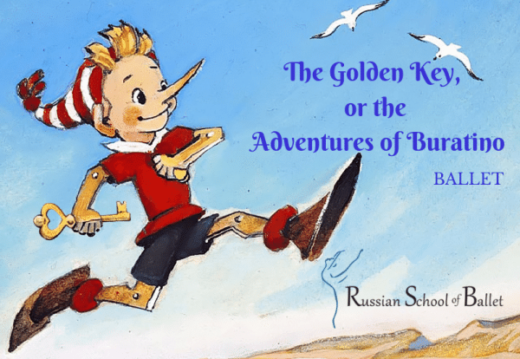
17 May The theme for RSB new ballet unveiled
Who is Buratino?
Buratino is the main character of the book The Golden Key, or the Adventures of Buratino (1936) by famous Russian writer Aleksey Tolstoy. The story is based on the 1883 Italian novel The Adventures of Pinocchio by Carlo Collodi. According to Tolstoy, he had read Pinocchio as a child, but, having lost the book, he started re-imagining it many years later in an attempt to come up with a series of bedside stories for his own children. The resulting story turned out to be so original and became so loved by the writer’s children, that he decided to put it to paper and publish it. The book was published in 1936. Buratino quickly became hugely popular among children in the Soviet Union and remains so to this day.
What is the story about?
According to the story, he is carved by Papa Carlo (the story’s version of Geppetto) from a log, and suddenly comes to life. Upon creation, Buratino comes out long-nosed due to Papa Carlo’s sloppy woodworking. Papa Carlo tries to shorten it, but Buratino resists.
Papa Carlo then sells his only good jacket in order to buy an Alphabet book for Buratino and sends him to school. However, the boy becomes distracted by an advertisement for a local puppet theater show, and exchanges his book for a ticket to the show. There he befriends other puppets, but the evil puppet master Karabos Barabos wants to destroy him because Buratino disrupted the show.
Karabos Barabos releases Buratino after he learns that Papa Carlo’s home contains a secret door. A Golden Key that Karabos Barabos once possessed, but later lost, opens this secret door. The story proceeds to tell of Buratino and his friends’ hunt for the Golden Key, and their struggle against the evil Karabos Barabos and his loyal friend Duremar, as well as a couple of crooks: Alice the Fox and Basilio the Cat, who are after Buratino’s coins.
In November, all story’s characters will come to life on the stage of the Roodepoort Theatre in a new ballet production by Russian School of Ballet.

